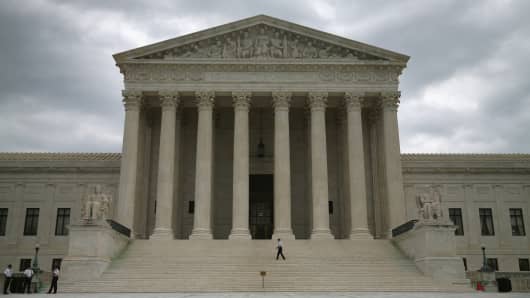Has Obamacare had an inadvertent poison pill all along?
That is what the Supreme Court will have to decide now that it has agreed to review the latest challenge to the law formally known as the Patient Protection and Affordable Care Act. As Adam Liptak put it in the final paragraph of his front-page New York Times story on the high court's decision to accept review, the question to be decided "is whether six words in the law contain the seeds of its own destruction."
Read MoreMassachusetts town may ban tobacco
The provision in question makes refundable tax credits available to those who purchase health insurance through "an exchange established by the State," the six words to which Mr. Liptak referred. Where a state declines to establish such an exchange, the Act requires the U.S. Secretary of Health and Human Services to establish and operate the exchange within the state. The Internal Revenue Service issued a regulation saying that a taxpayer qualifies for the refundable tax credit "regardless of whether the Exchange is established and operated by a State" or by the HHS.
To be clear, calling it a poison pill here isn't the same as when corporations strategically swallow such pills to repel hostile takeovers. Here, Congress and the president guessed that tax credits in the measure would lead virtually all states to establish their own health insurance exchanges. Their guess was wrong. The majority of the states – 36 in all – did not establish such exchanges. This pill may turn out to be poisonous only in hindsight.
Those challenging the IRS regulation in the case before the Supreme Court are lower-income Americans who live in states that have not established such an exchange. The plaintiffs assert that they don't want to buy the comprehensive health insurance the act mandates that all individuals have. They would be exempt from that requirement, and from paying the resulting penalty or tax from failing to have such insurance, if the federal subsidies did not apply in their states. The law excuses people with their income from having to obtain unsubsidized insurance.
Read MoreLast round for Obamacare fight
If plaintiffs win, it will "throw a debilitating wrench into the Act's internal economic machinery," according to the Fourth Circuit ruling the Supreme Court will review. That is because a far shallower pool of individuals will be required to buy insurance or pay a penalty ultimately causing insurance premiums to rise and yet additional people being exempt from the individual mandate because their incomes would be too low to mandate the purchase of the ever more expensive insurance. The spiral would continue.
The mandate that large employers offer their full-time employees health coverage or pay a penalty would, in turn, crumble in those states in which no one was eligible for federal tax credits. The D.C. Circuit Court of Appeals acknowledged this even as it struck down the IRS regulation the Supreme Court will review. "[E]ven more than with the individual mandate, the employer mandate's penalties hinge on the availability of credits. If credits were unavailable in states with federal Exchanges, employers would face no penalties for failing to offer coverage."
Note the irony. Defenders of the law will win only if they convince a majority of the justices that the provision at issue is ambiguous. Those defending the law say it is unclear. In that case, the court is likely to defer to the IRS's interpretation of the law because the IRS enforces the ACA.
Read MoreCatfight heats up between Apple, Fitbit
Those attacking the law will win only if they convince a majority of the justices that the provision is clear. Those challenging the law say it is perfectly clear. In that case, the court is likely to reject the IRS's rewriting of the law.
Much has been made of the threat to Obamacare now that the Republicans control both houses of Congress. Everyone knows that the president will veto any real measure. That makes this case a far greater existential threat to Obamacare than the recent election results. The president has no power to veto a Supreme Court decree.
Words in the law that the president signed in March of 2010 may feature prominently in the law's obituary in June of 2015 when the Supreme Court announces its decision. But who knows? The Supreme Court may render reports of the demise of Obamacare greatly exaggerated.
Commentary by Dan Eaton, a partner with the San Diego law firm of Seltzer Caplan McMahon Vitek where his practice focuses on defending and advising employers. He also is a professor at the San Diego State University College of Business Administration where he teaches classes in business ethics and employment law. Follow him on Twitter @DanEatonlaw.


